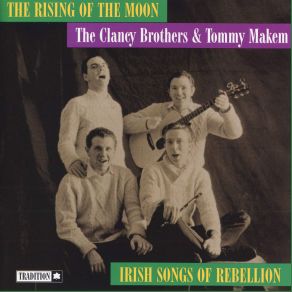The Rising of Moon: Irish Songs of Rebellion
Download links and information about The Rising of Moon: Irish Songs of Rebellion by Tommy Makem, The Clancy Brothers. This album was released in 1959 and it belongs to World Music, Songwriter/Lyricist, Contemporary Folk, Celtic genres. It contains 14 tracks with total duration of 33:38 minutes.

|
|
|---|---|
| Artist: | Tommy Makem, The Clancy Brothers |
| Release date: | 1959 |
| Genre: | World Music, Songwriter/Lyricist, Contemporary Folk, Celtic |
| Tracks: | 14 |
| Duration: | 33:38 |
| Buy it NOW at: | |
| Buy on iTunes $6.99 | |
Tracks
[Edit]| No. | Title | Length |
|---|---|---|
| 1. | Rising of the Moon | 2:27 |
| 2. | Croppy Boy | 2:36 |
| 3. | Foggy Dew | 3:30 |
| 4. | Minstrel Boy | 1:37 |
| 5. | Wind That Shakes the Barley | 3:08 |
| 6. | Tipperary Far Away | 1:51 |
| 7. | Kelly, the Boy from Killanne | 2:33 |
| 8. | Kevin Barry | 2:19 |
| 9. | Whack Fol the Diddle | 2:16 |
| 10. | O Donnell Aboo | 1:43 |
| 11. | Men of the West | 1:51 |
| 12. | Eamonn an Chnuic | 2:32 |
| 13. | Nell Flaherty's Drake | 2:39 |
| 14. | Boulavogue | 2:36 |
Details
[Edit]The Rising of the Moon was the Clancy Brothers and Tommy Makem's first appearance on wax as a group. Recorded in 1959, in the kitchen of Kenneth S. Goldstein (co-creator of the Tradition label with Paddy Clancy), the album is a largely austere collection of fight songs and ballads that trace the fighting history of Ireland. It features the singing of Paddy, Liam, and Tom Clancy; Makem sings as well, adds his tin whistle, and even plays rousing, military-style percussion on tracks like "Men of the West." While Makem and the Clancys' vocals are rich and melodic throughout the set, Rising of the Moon might be most striking for its instrumentation. Besides the input of Makem, the album features expressive guitar and harp, courtesy of Jack Keenan and Jack Malady, respectively. Both musicians help to lend Rising of the Moon its intimate, fireside feel; it's a sound that the Clancys and Makem would move away from on later, more crowd-pleasing releases, but here it helps imbue these songs with a respectful air. "Eamonn an Chniuic" is supported by the plucked harp like raindrops on a stubbornly wavering flower petal, while the instrument adds color to the guitar's urgent rhythm during "Foggy Dew." "Whack fol the Diddle" introduces one of the group's most famous singing techniques, while Makem's whistle livens up the title track's melody. But it's "Wind That Shakes the Barley" that could best combine aesthetic instrumentation with heartfelt emotion. This Tradition reissue includes Paddy's original liner notes and was digitally remastered for optimum sound quality.